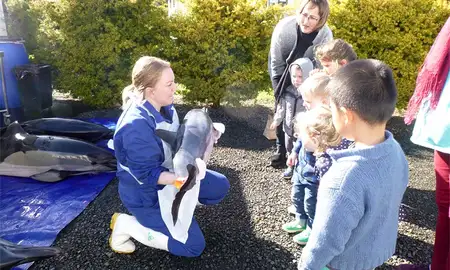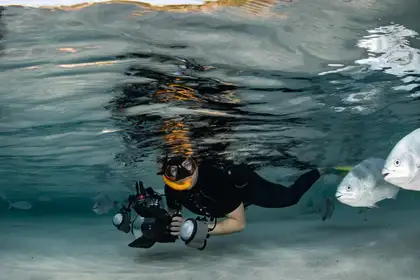
Dr Irene Middleton
Applying this passion to her doctoral studies, Dr Middleton explored how tropical and subtropical fish could be used as early indicators of climate-mediated biodiversity changes in Aotearoa New Zealand’s marine environment.
The 39-year-old had always envisioned diving into a PhD directly after completing her Bachelor of Science and Master of Science with Victoria University of Wellington. But life had different plans that saw her spend ten years working for the National Institute of Water and Atmospheric Research (NIWA), the Department of Conservation, and Northland Regional Council. During this time, Dr Middleton connected and collaborated with Massey researchers Dr Libby Liggins and Associate Professor David Aguirre, who were both familiar with her strengths, interests, and the current state of marine research in the field she was interested in.
This inspired Dr Middleton to complete her PhD studies with Massey as it allowed her to work closely with Dr Liggins and Dr Aguirre who became her supervisors. With her fieldwork spanning from Whangaroa in the north to Whitianga in the south, she worked remotely throughout most of her PhD research, visiting Massey’s Auckland campus once a fortnight and keeping in touch with her supervisors via Zoom.
She says her ambition was to better understand the patterns in occurrence of tropical fish in our waters, and what that could mean for biodiversity and the future of the marine environment.
“Tropical and subtropical species are early indicators of how climate change may affect biodiversity. Although these species have been recorded in Aotearoa New Zealand for more than 100 years, there had yet to be identification or recognition if more were turning up, if different species were arriving, and whether they were starting to persist.”
Using sighting data from fishers, divers, and underwater photographers meant she could increase awareness around whether there were hotspots in our waters for tropical and subtropical fish species. It also provided a way to map if these species were likely to become a permanent part of Aotearoa New Zealand’s fish biota if climate change continues to warm the oceans.
During her PhD research, Dr Middleton began a Facebook group called What’s That Fish NZ as a platform for people to be able to share their unusual fish sightings. Within months, the page had a committed following with active participants and citizen scientists contributing more than 2500 sightings of target fish needed for the study. Dr Middleton says she was surprised by the level of engagement from marine citizen scientists, who are, as she describes, incredibly valuable assets for increasing the availability of data and observations for scientists.
“The citizen scientists who contributed sightings helped to identify 18 species of fish that had not been recorded around New Zealand in the past and we found that north-eastern New Zealand is a hotspot for tropical fishes. I’m very passionate about empowering oceangoing citizens to be involved in marine research as they are experts in their local area.
“Marine citizen science is in its infancy in New Zealand. I hope to continue to incorporate it in my research in the future and to build on the tools, relationships, and lessons learned during my PhD to encourage broader participation by citizen scientists and the acceptance of their contributions and data by scientists.”
Dr Middleton is determined to continue to advance the work she’s started with future research, particularly around how our native fish are being impacted by climate change.
“Native fish like our Snapper, Kingfish, and New Zealand demoiselle are not immune to warming waters. I hope to extend my research to include native species and figure out if and how they may be moving south as a response to the changing climate.”
After being offered a position as a Marine Ecologist at NIWA straight after completing her PhD, Dr Middleton’s all set to make her ambitions a reality.
“My work at NIWA includes marine biosecurity, fisheries, and citizen science so it brings together aspects of my previous work experience and the research I undertook with my PhD. I still have a few manuscripts I hope to publish, and will be looking for opportunities to expand citizen science platforms to continue monitoring changes to our marine fish community.”
While Dr Middleton was born in the Netherlands, and moved between here and there throughout her childhood and teenage years, she says Aotearoa New Zealand is definitely home now. She moved to Northland 13 years ago and now lives on a six-hectare bush block on the beautiful Tutukaka coast with her husband Crispin and their two beloved dogs, Moko and Wolfie.
Dr Middleton and Crispin, who is also a marine ecologist and an underwater photographer, spend a lot of their time diving at the Poor Knights Island marine reserve just off the coast; a pastime Crispin would encourage when he could see she needed a break from study to clear her head.
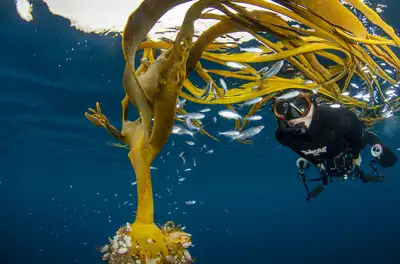
Dr Middleton in her happy place
Though Dr Middleton says she loved every minute of her PhD, the three-year task of handing in a thesis involved a lot of self-discipline, motivation, and learning to be flexible.
“I had a plan at the start of my PhD of what I thought the project would look like, but quickly learned that you need to be adaptable and roll with the punches. Things might not always work out the way you planned but there are always continued opportunities for interesting research based on what you learn along the way. I had an incredibly talented and supportive group of supervisors that pushed me to get the most out of the experience, and I was also lucky enough to receive scholarships from Massey University and the Ministry for Primary Industries.
“To future and current PhD students, my advice is that you need to be sure you’re passionate about what you’re studying. It’s your project, your work, and will become a big part of your life. It’s a challenge but also incredibly rewarding, but it must be driven by you. It’s also a massive opportunity to learn about yourself. Remember that it’s OK to be uncomfortable and to be challenged – that’s when the most growth occurs!”
She considers the completion of her PhD a team effort, with the motivation and support offered by her supervisors and her family helping her through.
“Without my supervisors, I wouldn’t have pushed myself outside of my comfort zone. My mum, dad, and sister have been there every step of the way, always with a supportive ear which made the hard days a lot more bearable!”
Related news
Three Massey staff members receive PhD at graduation
Three Massey staff members have been conferred with doctoral degrees among the more than 1300 graduates across the five Auckland ceremonies and celebrations this week.
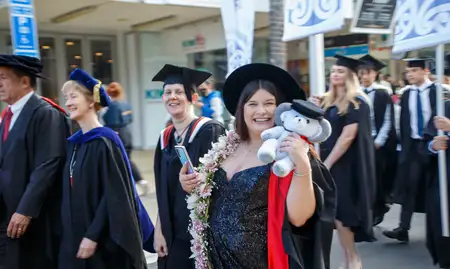
PhD graduate’s research is the first holistic assessment of the ecology of ponds in Auckland
Born and raised in Ghana, pursuing higher learning and graduating with a PhD has been a dream come true for Dr Abigail Kuranchie.
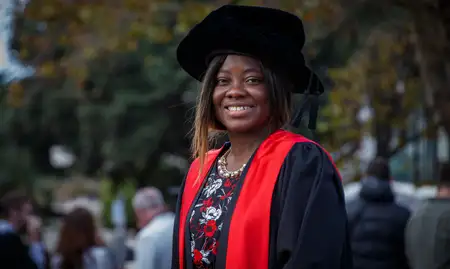
Massey’s next generation of marine scientists
The Auckland campus Early Learning Centre was treated to a rare marine biology experience recently when staff and children were invited to view seven common dolphins.
